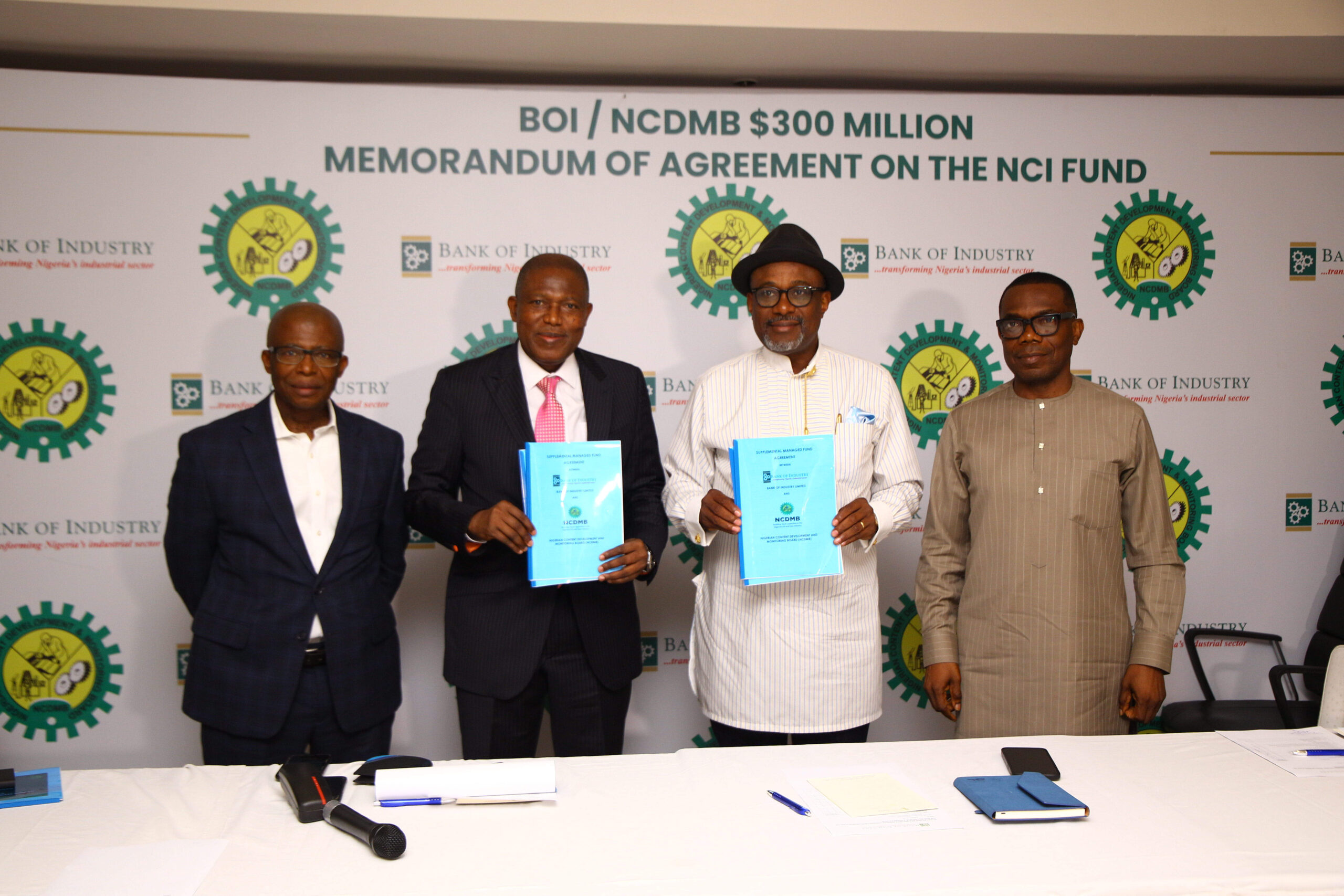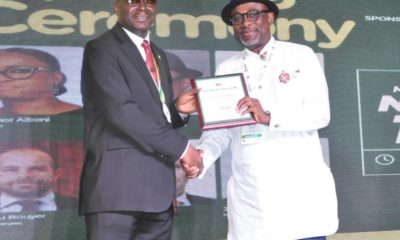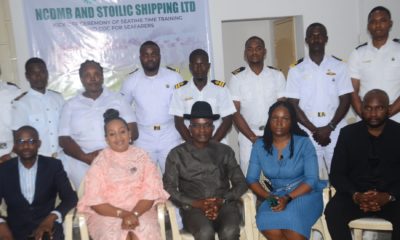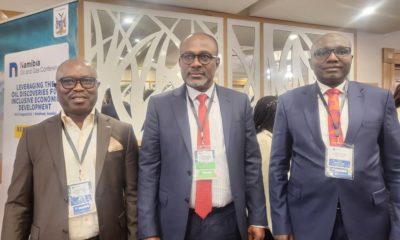Business
NCDMB, BOI Sign Amendment of MoU on NOGaPS Manufacturing Fund

..Angola, Namibia to replicate funding model
Precious Adelola
The Nigerian Content Development and Monitoring Board (NCDMB) and the Bank of Industry (BoI) have signed an amendment to the Memorandum of Understanding (MoU) on the $50million NOGaPS Manufacturing Fund.
The Fund was created by the NCDMB and domiciled with BoI to attract oil and gas equipment manufacturers to the Nigerian Oil and Gas Parks Scheme (NOGaPS) facilities established by the NCDMB, and increase access to affordable finance by the manufacturing entities.
The signing of the amended MoU took place in Lagos on Friday at the 2023 second quarter Review Meeting of the Nigerian Content Intervention Fund (NCIFund).
In his remarks, the Executive Secretary, NCDMB, Engr Simbi Kesiye Wabote underlined the tremendous success of the NCIFund in catalyzing capacity development and investments in the Nigerian oil and gas industry. He hinted that the Fund serves as a model for local content practice across the African continent and inspired the creation of the African Energy Bank by the African Petroleum Producers Organization (APPO), in partnership with the African Export Bank (Afreximbank).
He added that countries like Angola and Namibia are currently engaging the Board, with a view to understand the workings of the NCI Fund, so as to replicate same in their jurisdictions.
In Wabote’s words “today, Angola is thinking of establishing a similar credit line for their oil and gas companies. I think the parliament recently approved some sum of money for them to manage in that respect. Namibia is planning to do the same with the potential enactment of a Local Content Act.”
Wabote further commended the Bank of Industry for the successes being recording in the management of the NCI Fund, assuring that the Board will continue to look for other opportunities to increase its partnership with BoI.
He said: “Considering the effectiveness and success recorded by BoI, NCDMB may consider inviting BoI to send a nominee that will act as independent Director to the Board of Directors of some of the companies that we have invested equity in. This will help them overcome some of the prevailing issues around governance, liquidity and technical optimization.”
On his part, the Managing Director of the Bank of Industry, Mr Olukayode Pitan expressed confidence in the future performance of the Board’s funds domiciled in the bank while noting that these quarterly review meetings will impact on sustaining the effective disbursements and recovery of these funds.
According to him, the NCI Fund is performing excellently with 194 applications equalling US$1 billion /₦80.6 billion with 69 disbursements totalling US$324 million /₦38.4 billion as at the day of reporting.
The Board established the NCI Fund in 2018 with the purpose of financing Oil and Gas companies to increase capacity and grow Nigerian Content in the Industry Presently, the NCI Fund has five product lines which are being managed by the Bank of Industry. They include – Manufacturing Finance -$10m; Asset Acquisition Finance -$10m; Contract Finance -$5m; Loan Refinance -$10m and Community Contractor Finance – ₦20 million.
The US$50 million NOGaPS Fund was launched as a separate product in March 2023 to incentivize companies that will be domiciled and manufacture oil and gas equipment components within the NCDMB oil and gas parks being established at different locations across the country, with the sites in Bayelsa and Cross River State open for occupation.
The Board also has a US$30 million Working Capital Fund for oil and gas service companies and US$20m Fund for Women in Oil and Gas Intervention Fund. The last two facilities are administered by the Nexim Nigerian Export-Import Bank and the agreements were signed in mid-2021.
Business
Savannah Energy Provides Unaudited FY 2024 Trading Updates

Savannah Energy has shared a trading update on its Nigerian operations and other markets in Africa, including up-to-date cash collections in its Nigerian business.
According to the update, made available on Thursday in Lagos, its gross production in Nigeria averaged 23.1 Kboepd for FY 2024, broadly in line with the prior year’s 23.6 Kboepd, of which 88% was gas (FY 2023: 91%).
On the update, CEO of Savannah Energy, Andrew Knott, said, “I am pleased to provide a FY trading update which demonstrates the continued progress we have made in 2024, a year which saw the highest level of cash collections ever recorded by our Nigerian business. 2025 is expected to be an exciting year for our Company: we have a large planned operational programme in Nigeria which is anticipated to enhance both our oil and gas production levels and capacity; we intend to progress our R3 East oil development project in Niger; we continue to pursue key acquisitions in the upstream oil and gas space; and we continue to seek to build our power business.
“Fundamentally, Savannah remains unequivocally an “AND” company, seeking to deliver strong performance both for the short AND long term across multiple fronts, and pursuing growth opportunities in both the hydrocarbon AND power sectors.”
The update It also shows that it generated a Total Income of US$393.6 million in 2024, compared to FY 2023’s US$289.8 million. This consists of Total Revenues of US$258.7 million and Other operating income of US$134.9 million.
The report also shows that Savannah’s FY 2024 Total Revenues were ahead of the previously issued financial guidance of greater than US$245 million, while FY 2024 financial guidance is reiterated for Operating expenses plus administrative expenses at ‘up to US$75 million’. The company expects its FY 2024 capital expenditure to come in lower than planned (previously guided at ‘up to US$50 million’) due to the phasing of spend.
ALSO READ: CSR: Dangote Awards Scholarships To 473 Students
According to the update, Savannah’s cash collections in 2024 amounted to US$248.5 million, a slight increase from the US$206 million it received in 2023. The report further shows that its cash balances as at 31 December 2024 stood at US$32.6 million, compared to the 31 December 2023 figure of US$107.0 million.
The report shows that the company’s midstream subsidiary, Accugas Limited, had as at 31 December 2024 drawn down on its NGN332 billion of the NGN Transitional Facility, with the resulting funds being converted to US$, which, along with cash held, was used to partially prepay the existing Accugas US$ Facility, leaving a balance as at 31 December 2024 of approximately US$212.3 million.
The report also provided new updates on Accugas’ US$45 million Uquo Central Processing Facility (“Uquo CPF”) compression project in Nigeria, noting that its commissioning which will enable the expansion of gas production in the medium term is well underway.
The report highlighted the progress being made in the procurement process of long lead equipment in Nigeria for a potential two-well drilling campaign on the Uquo Field in H2 2025, with an additional gas development well expected to add up to 80 MMscfpd of supplemental production capacity and a potential exploration well targeting an Unrisked Gross gas initially in place (“GIIP”) of 154 Bscf (25.7 MMboe) of incremental gas resources.
The update shows that progress is also being made in the planned Savannah acquisition of Sinopec International Petroleum Exploration and Production Company Nigeria Limited, whose principal asset is a 49% non-operated interest in the Stubb Creek oil and gas field (“Stubb Creek”), with regulatory approval and completion being targeted in Q1 2025. Following the completion of the acquisition, Savannah intends to commence an expansion programme which is anticipated to increase Stubb Creek gross production from an average of 2.7 Kbopd in 2024 to approximately 4.7 Kbopd.
In Niger, Savannah continues to seek to progress its 35 MMstb (Gross 2C Resources) R3 East oil development in South-East Niger, while it continues to push for a potential alternative transaction structure to acquire a material stake in producing oil and gas assets in South Sudan as previously announced on 20 December 2024.
On the renewable energy front, the update shows that Savannah has up to 696 MW of renewable energy projects currently in motion, including the up to 250 MW Parc Eolien de la Tarka wind farm project in Niger and the up to 95 MW Bini a Warak hybrid hydroelectric and solar project in Cameroon. A firm believer in Africa’s transition to renewable energy, Savannah continues to target a portfolio of up to 2 GW+ of power projects in motion by the end of 2026.
Business
Nigeria Can Achieve 5.5% GDP Growth – NESG
The Nigerian Economic Summit Group (NESG) has projected that the country has the potential to achieve a 5.5% growth in Gross Domestic Product (GDP) if critical policy reforms are sustained.
This was disclosed on Thursday during the launch of the NESG’s 2025 Macroeconomic Outlook report.
Speaking at the event, the Chief Economist and Director of Research & Development at NESG, Dr. Olusegun Omisakin, highlighted the need for more efficient policy implementation to unlock Nigeria’s economic potential.
READ MORE: Davido Is Richer Than His Billionaire Father – Ibrahim Chatta Claims
“We believe at the optimal level, if we embark on more efficient policy reforms, the Nigerian economy has the potential, the GDP to end up at 5.5 per cent, and we believe that this is achievable,” Omisakin stated.
More to follow……….
Business
CBN Approves Release Of Nigerian FX Code
The Central Bank of Nigeria (CBN) has announced the release of the Nigerian Foreign Exchange (FX) Code, a set of guidelines designed to promote ethical conduct among authorized dealers in the country’s FX market.
In a statement, the apex bank disclosed that the official launch of the Code would take place on Tuesday, January 28, 2025, at the CBN Head Office Auditorium in Abuja.
READ MORE: Dangote Denies Culpability In Pumping Up Petrol Price
“The Central Bank of Nigeria has approved the release of the Nigerian Foreign Exchange (FX) Code as a guideline to the banking industry to promote the ethical conduct of authorised dealers in the Nigerian Foreign Exchange Market,” the statement read.
The introduction of the FX Code is expected to enhance transparency, accountability, and professionalism within Nigeria’s foreign exchange ecosystem, aligning it with global best practices.
The event is anticipated to attract key stakeholders in the financial and banking sectors, as well as representatives from authorized FX-dealing institutions across the country.






















